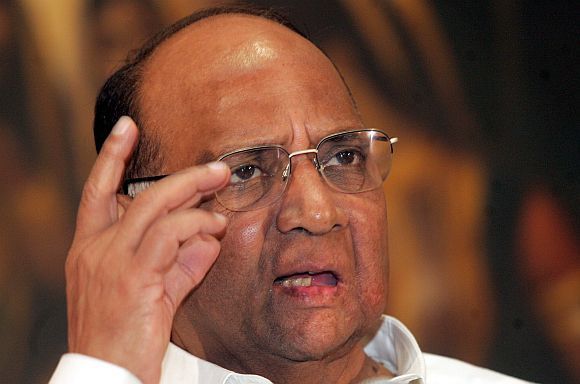 | « Back to article | Print this article |
 The NCP has seen the largest flow from its ranks to the other parties, more towards the BJP before the elections, even up to the last minute. The Sena and BJP together could, in power, become even bigger magnets. Disillusionment with the NCP leadership has been growing, which may have forced its hand, says Mahesh Vijapurkar.
The NCP has seen the largest flow from its ranks to the other parties, more towards the BJP before the elections, even up to the last minute. The Sena and BJP together could, in power, become even bigger magnets. Disillusionment with the NCP leadership has been growing, which may have forced its hand, says Mahesh Vijapurkar.
The Nationalist Congress Party’s offer of outside support to Bharatiya Janata Party will now have all conspiracy theorists to say that this was a foretold development. The quick split of the Congress and the NCP in tandem, within an hour of the BJP and Sena parting ways was then itself seen as a concerted move.
The NCP is not wrong in saying that being the single largest party, the BJP is the only party which can rule the state and it wants to back such an effort. It had explored other possibilities, implying it was adding numbers of NCP, Sena and Congress. Apparently it didn’t work out.
Sharad Pawar’s offer to provide the outside support to enable form a government has several interesting factors. The main one is that Nationalist Congress Party cannot afford to have the Shiv Sena emerging stronger than it has in the elections as the second largest party.
The Shiv Sena in the government, on whatever conditions it manages to impose on BJP, would mean that the NCP would have to combat the worse odds in rebuilding itself. It is going to be a long and arduous climb back on feeble legs and face the risk of a break up.
The confidence of NCP men in the leadership is already the lowest ever. But this Pawar move does help to ward off the inevitable in the short term at least even as he would be pilloried for being unprincipled. But any post-poll tie of former opponents is always unprincipled.
After all, the NCP has seen the largest flow from its ranks to the other parties, more towards the BJP before the elections, even up to the last minute. The Sena and BJP together could, in power, become even bigger magnets. Disillusionment with the NCP leadership has been growing.
However, the other interesting aspect is that by this outside support, the NCP would hope to drive the Shiv Sena away from the BJP, and power. The idea appears to be to keep the wedge between the two and benefit. Outside support can be conditional, and conditions can change on the daily basis.
BJP’s national chief -- described as a strategist who marketed the Narendra Modi brand -- Amit Shah has confessed that he hasn’t had any word with any party but believed that NCP’s offer was unconditional. In politics, there are no altruists. NCP cannot be one.
What would the BJP prefer? A Shiv Sena, realising that BJP desperately needs support, can agree to a tie-up. Its intent would have been to make the party cringe and beg, impose impossible conditions and have its way. But with the NCP offer, things change. The Sena would have to get off its high horse.
If the Shiv Sena agrees to join the BJP in forming a government it would amount to a clear flouting of the reasons why each of them secured votes to the extent they did. Similarly would be the case when the NCP offers of outside support to the BJP.
However, such is the ways of Indian politics that anything can happen; they indeed have. In 1999, the Congress and the NCP kissed and made up after the two fell short by a mile to form a government. The NCP had made Sonia Gandhi’s origins an issue and sought votes.
Maharashtra is faced once again with a fractured verdict with none getting a majority. The BJP is expected to be called to form the government being the single largest party. Any post-poll tie-up with Sena is going to be explained away as people’s wish -- the state deserves a government.
This time too, Maharashtra is faced with a similar situation, neither the BJP nor the Shiv Sena getting enough to form a government, and the Congress and the NCP pushed to the margins. The verdict was not for the either of the two former partners to sup together again.
This is so especially because the gap between the BJP and the Sena is large. Though they are the first two, led by the former, and the voters never meant they should work together again. If the politicians say so, it is because such a view is self-serving.
Only political expediency forces advancement of such facile arguments, making them facile, a convenience, because each of the political party in the fray fought against each other. The voter does not work out such precise arithmetic.